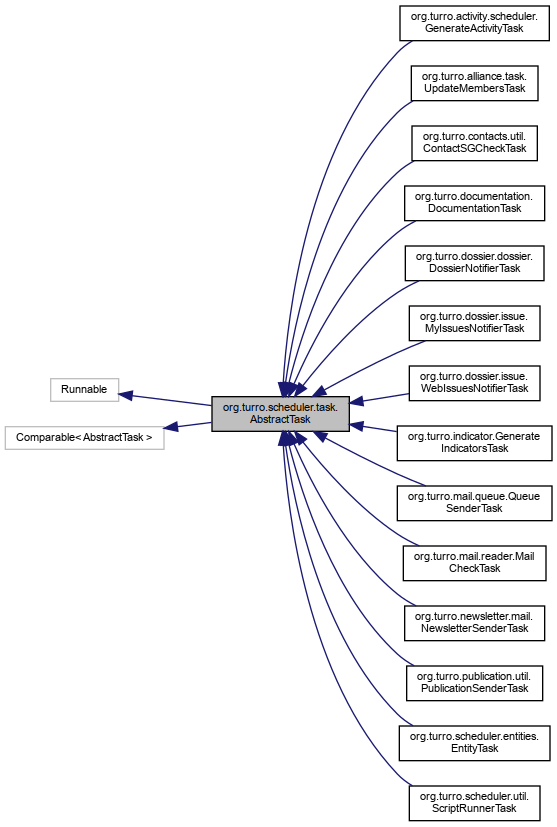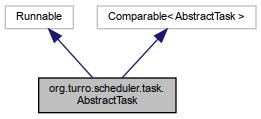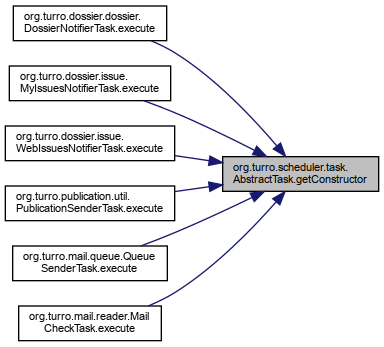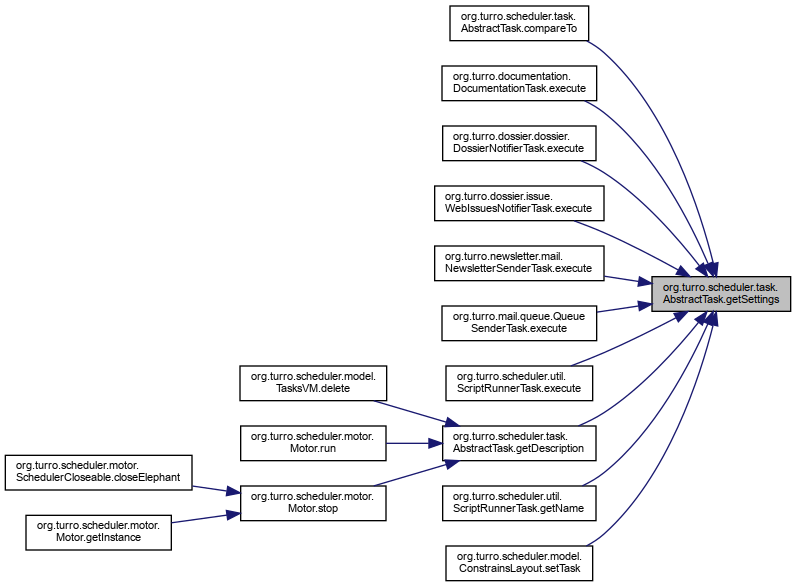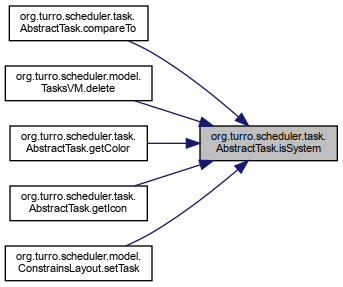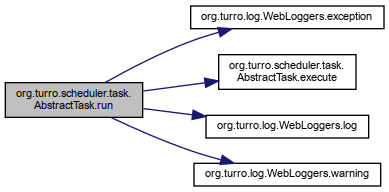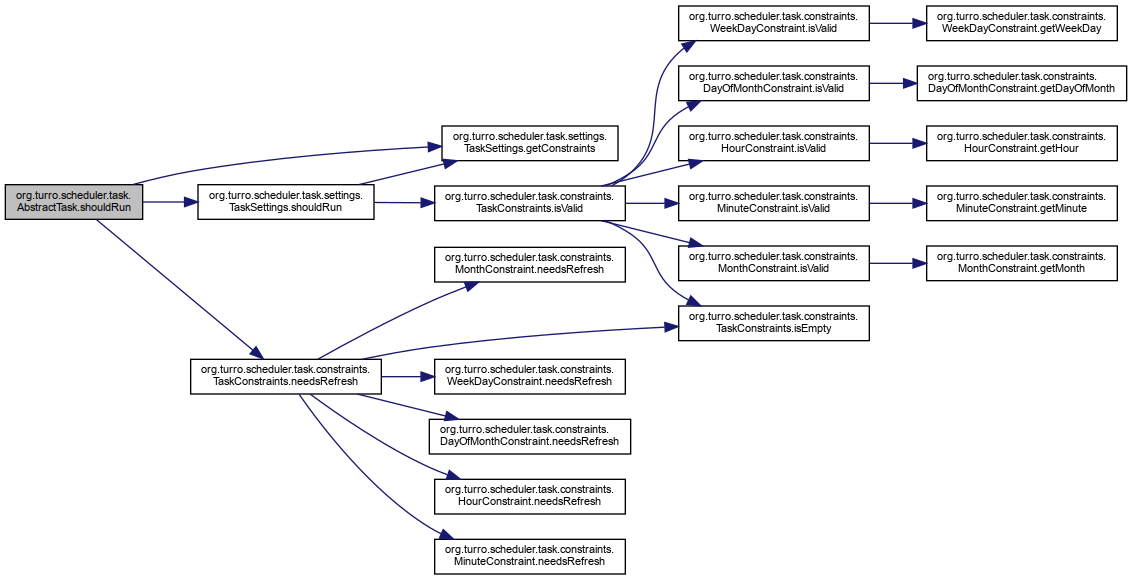◆ compareTo()
| int org.turro.scheduler.task.AbstractTask.compareTo |
( |
AbstractTask |
o | ) |
|
◆ doRun()
| void org.turro.scheduler.task.AbstractTask.doRun |
( |
Motor |
motor | ) |
|
◆ execute()
| abstract void org.turro.scheduler.task.AbstractTask.execute |
( |
| ) |
|
|
abstract |
Reimplemented in org.turro.scheduler.util.ScriptRunnerTask, org.turro.scheduler.entities.EntityTask, org.turro.mail.reader.MailCheckTask, org.turro.mail.queue.QueueSenderTask, org.turro.alliance.task.UpdateMembersTask, org.turro.indicator.GenerateIndicatorsTask, org.turro.activity.scheduler.GenerateActivityTask, org.turro.publication.util.PublicationSenderTask, org.turro.newsletter.mail.NewsletterSenderTask, org.turro.dossier.issue.WebIssuesNotifierTask, org.turro.dossier.issue.MyIssuesNotifierTask, org.turro.dossier.dossier.DossierNotifierTask, org.turro.documentation.DocumentationTask, and org.turro.contacts.util.ContactSGCheckTask.
◆ getColor()
| String org.turro.scheduler.task.AbstractTask.getColor |
( |
| ) |
|
◆ getConstructor()
| IConstructor org.turro.scheduler.task.AbstractTask.getConstructor |
( |
| ) |
|
◆ getDataLabel()
| abstract String org.turro.scheduler.task.AbstractTask.getDataLabel |
( |
| ) |
|
|
abstract |
Reimplemented in org.turro.scheduler.util.ScriptRunnerTask, org.turro.scheduler.entities.EntityTask, org.turro.mail.reader.MailCheckTask, org.turro.mail.queue.QueueSenderTask, org.turro.alliance.task.UpdateMembersTask, org.turro.indicator.GenerateIndicatorsTask, org.turro.activity.scheduler.GenerateActivityTask, org.turro.publication.util.PublicationSenderTask, org.turro.newsletter.mail.NewsletterSenderTask, org.turro.dossier.issue.WebIssuesNotifierTask, org.turro.dossier.issue.MyIssuesNotifierTask, org.turro.dossier.dossier.DossierNotifierTask, org.turro.documentation.DocumentationTask, and org.turro.contacts.util.ContactSGCheckTask.
◆ getDescription()
| String org.turro.scheduler.task.AbstractTask.getDescription |
( |
| ) |
|
◆ getIcon()
| String org.turro.scheduler.task.AbstractTask.getIcon |
( |
| ) |
|
◆ getName()
| abstract String org.turro.scheduler.task.AbstractTask.getName |
( |
| ) |
|
|
abstract |
Reimplemented in org.turro.scheduler.util.ScriptRunnerTask, org.turro.scheduler.entities.EntityTask, org.turro.mail.reader.MailCheckTask, org.turro.mail.queue.QueueSenderTask, org.turro.alliance.task.UpdateMembersTask, org.turro.indicator.GenerateIndicatorsTask, org.turro.activity.scheduler.GenerateActivityTask, org.turro.publication.util.PublicationSenderTask, org.turro.newsletter.mail.NewsletterSenderTask, org.turro.dossier.issue.WebIssuesNotifierTask, org.turro.dossier.issue.MyIssuesNotifierTask, org.turro.dossier.dossier.DossierNotifierTask, org.turro.documentation.DocumentationTask, and org.turro.contacts.util.ContactSGCheckTask.
◆ getSettings()
| TaskSettings org.turro.scheduler.task.AbstractTask.getSettings |
( |
| ) |
|
◆ isDone()
| boolean org.turro.scheduler.task.AbstractTask.isDone |
( |
| ) |
|
◆ isSystem()
| abstract boolean org.turro.scheduler.task.AbstractTask.isSystem |
( |
| ) |
|
|
abstract |
Reimplemented in org.turro.scheduler.util.ScriptRunnerTask, org.turro.scheduler.entities.EntityTask, org.turro.mail.reader.MailCheckTask, org.turro.mail.queue.QueueSenderTask, org.turro.alliance.task.UpdateMembersTask, org.turro.indicator.GenerateIndicatorsTask, org.turro.activity.scheduler.GenerateActivityTask, org.turro.publication.util.PublicationSenderTask, org.turro.newsletter.mail.NewsletterSenderTask, org.turro.dossier.issue.WebIssuesNotifierTask, org.turro.dossier.issue.MyIssuesNotifierTask, org.turro.dossier.dossier.DossierNotifierTask, org.turro.documentation.DocumentationTask, and org.turro.contacts.util.ContactSGCheckTask.
◆ run()
| void org.turro.scheduler.task.AbstractTask.run |
( |
| ) |
|
◆ setConstructor()
| void org.turro.scheduler.task.AbstractTask.setConstructor |
( |
IConstructor |
constructor | ) |
|
◆ setLastExecuted()
| void org.turro.scheduler.task.AbstractTask.setLastExecuted |
( |
Date |
lastExecuted | ) |
|
◆ setSettings()
| void org.turro.scheduler.task.AbstractTask.setSettings |
( |
TaskSettings |
settings | ) |
|
◆ shouldRun()
| boolean org.turro.scheduler.task.AbstractTask.shouldRun |
( |
Date |
now | ) |
|
◆ stop()
| void org.turro.scheduler.task.AbstractTask.stop |
( |
| ) |
|
The documentation for this class was generated from the following file:
